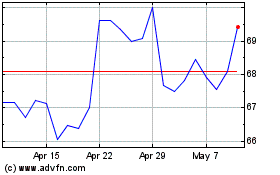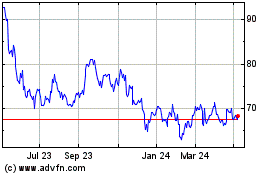Vodafone Enters Cloud Agreement With IBM, Keeping 5G in Mind
January 18 2019 - 11:13AM
Dow Jones News
By Sara Castellanos
Vodafone Group PLC's business services division will offer
clients access to more cloud services this year, through a deal
with International Business Machines Corp.
The goal is to enable clients to get faster speeds when they
deploy technologies that combine artificial intelligence, 5G and
the Internet of Things.
"Businesses are finding there's quite a bit of complexity in
knitting (technologies) all together," said Greg Hyttenrauch,
security and cloud-services director of Vodafone Business and
co-leader of the venture. "This is an opportunity to combine what
we're both good at, in cloud and connectivity."
Vodafone Business, the services unit of the telecom company,
expects that its deal with IBM will benefit its existing enterprise
customers in industries such as agriculture and energy. Some farms
already are using the telecom company's cloud services and
connected sensors to aggregate and analyze data, Mr. Hyttenrauch
said.
The deal shows how telecommunications companies with existing
cloud-service units are taking advantage of companies with greater
resources to benefit their existing customers.
"For a while, the telecom carriers were looking at diversifying
into the cloud business...but when you start to compete against the
Amazons, Microsofts and Googles of the world, the amount of
financial resources required is just enormous," said Mark Hung,
research vice president at Gartner Inc., who focuses on AI and
IOT.
As companies struggled to keep up with multiple technologies,
such as 5G, cloud and AI, many of them opted to seek out
partnerships.
"There's a lot of crossbreeding that's going to happen between
different technologies," Mr. Hung said. "No one company can do it
all."
Under the new venture, Vodafone Business customers will have
access to IBM's cloud offerings, including automation, optimization
and artificial intelligence.
Farmers are expected to gain access to IBM Watson's AI services,
which will allow them to get insights on when to harvest crops,
apply pesticides and reduce waste, Mr. Hyttenrauch said.
When fifth-generation wireless technology, known as 5G rolls
out, Vodafone Business's customers will be able to transmit data
faster with lower latency connection speeds.
The Wall Street Journal has previously reported on one aspect of
5G's impact on agriculture: The increased use of sensors on
livestock to gauge their health.
Energy companies also stand to benefit from IBM's various cloud
services, along with 5G connectivity, said Michael Valocchi,
general manager for IBM Services and co-leader of the venture. New
insights could help those in the energy industry better predict
power outages, he said.
The U.K. telecommunications business, which has enterprise
clients in areas across the U.K., Germany and Ireland, has said it
aims to make the 5G experience seamless for customers by 2020. But
the transformation that will come from widespread commercial 5G
deployments in areas ranging from manufacturing to energy is still
a decade away, the WSJ has previously reported.
As part of the new venture, Vodafone Business will pay IBM $550
million over eight years to manage IT services related to its cloud
and hosting unit. Vodafone's existing IT team won't shrink, Mr.
Hyttenrauch said. The two companies also will open a London-based
facility this year that will employ sales and technology staff from
both.
Vodafone's clients aren't limited to IBM's cloud services. They
also will gain access to IBM's cloud-service partners -- Microsoft
Corp., Amazon.com Inc. and Alphabet Inc.'s Google.
Write to Sara Castellanos at sara.castellanos@wsj.com
(END) Dow Jones Newswires
January 18, 2019 11:58 ET (16:58 GMT)
Copyright (c) 2019 Dow Jones & Company, Inc.
Vodafone (LSE:VOD)
Historical Stock Chart
From Mar 2024 to Apr 2024

Vodafone (LSE:VOD)
Historical Stock Chart
From Apr 2023 to Apr 2024
